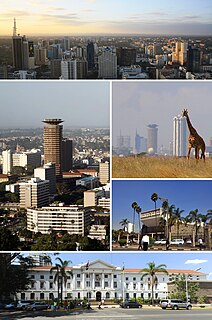
LexisNexis Group is a corporation providing computer-assisted legal research (CALR) as well as business research and risk management services.
During the 1970s, LexisNexis pioneered the electronic accessibility of legal and journalistic documents. As of 2006, the company has the world's largest electronic database for legal and public-records related information.
Calestous Juma FRS HonFREng was an internationally recognised authority in the application of science and technology to sustainable development worldwide. He was named one of the most influential 100 Africans in 2012, 2013 and 2014 by the New African magazine. He was Professor of the Practice of International Development and Faculty Chair of the Innovation for Economic Development Executive Program at Harvard Kennedy School. Juma was Director of the School's Science, Technology and Globalization Project at Harvard Kennedy School as well as the Agricultural Innovation in Africa Project funded by the Bill and Melinda Gates Foundation. His latest book, Innovation and Its Enemies: Why People Resist New Technologies. was published by Oxford University Press in 2016.
Raymond Mark Henaghan is a former Dean of the University of Otago Faculty of Law in Dunedin, New Zealand up until April 2018. His research interests include family law, especially law relating to children, law regarding the human genome, and judiciary law.

Strathmore University is a chartered university based in Nairobi, Kenya. Strathmore College was started in 1961, as the first multi-racial, multi-religious Advanced-level Sixth Form College offering science and arts subjects, by a group of professionals who formed a charitable educational trust. Saint Josemaría Escrivá, founder of Opus Dei, inspired and encouraged them to start the College. It is a catholic university.
Strathmore has a particularly successful accounting program: 60% of the CPA finalists in Kenya coming from it in the past ten years, dating back from 2007. The current Vice-Chancellor of the University is Professor John Odhiambo.
Julian Morris is Vice President of Research at Reason Foundation. In 2001 he founded and was the Executive Director of the London-based think-tank International Policy Network. He was formerly a Research Fellow and subsequently Director of the Environment and Technology Programme of the Institute of Economic Affairs. He is also a visiting professor of Economics at the University of Buckingham. Recently he became co-editor with Indur M. Goklany of the Electronic Journal of Sustainable Development]. Morris serves on the editorial advisory board of the academic journal, Energy & Environment.

Gujarat National Law University (GNLU) is a National Law University established under the Gujarat National Law University Act, 2003 in the state of Gujarat. The university is located at Gandhinagar, which is the capital of Gujarat and is located 23 kilometers north of the city of Ahmedabad. The statute provides that the Chief Justice of India or a Senior Supreme Court Judge serve as the Visitor of the university. The Director, Bimal N. Patel serves as the chief administrator. The university started in 2004 and has five batches of 180 students each under training.
David Victor Canter is a psychologist. He began his career as an architectural psychologist studying the interactions between people and buildings, publishing and providing consultancy on the designs of offices, schools, prisons, housing and other building forms as well as exploring how people made sense of the large scale environment, notably cities. He set up the Journal of Environmental Psychology in 1980. His work in architecture led to studies of human reactions in fires and other emergencies. He wrote about investigative psychology in Britain. He helped police in 1985 on the Railway Rapist case. He was the Professor of Psychology at the University of Surrey for ten years, where he developed investigative psychology described in detail in Investigative Psychology: Offender Profiling and the Analysis of Criminal Action and a course curriculum. He set up and was Director of the Centre For Investigative Psychology which is based at the University of Liverpool. Since 2009 he has been at the University of Huddersfield where he is the Director of the International Research Centre in Investigative Psychology. He is the founder and director of the International Academy for Investigative Psychology, an academy for researchers seeking to apply social science to investigative and legal processes.
Robin Attfield, MA (Oxon), PhD (Wales) has been Professor of Philosophy at Cardiff University since 1992.
Johanna Gibson is Herchel Smith Professor of Intellectual Property Law in the Centre for Commercial Law Studies, Queen Mary, University of London.
Patrick Bond is professor of political economy at the University of the Witwatersrand Wits School of Governance. He was formerly associated with the University of KwaZulu-Natal, where he directed the Centre for Civil Society from 2004-2016. His research interests include political economy, environment, social policy, and geopolitics.

Construction Law is a monthly English-language journal providing news and articles on the construction industry. The journal is written for the non-legal professional involved in contractual and other legal matters in the industry. The journal is owned by LexisNexis which is part of Reed Elsevier.
The New Zealand Intellectual Property Journal is a quarterly law review published by Butterworth since 1995. It is available on LexisNexisNZ and covers intellectual property law. The language of publication is English. The preferred abbreviation is: NZIPJ
Law360 is a subscription-based, legal news service operated by the Portfolio Media company, a subsidiary of LexisNexis.
Alastair James Kerr was an Advocate of the High Court of South Africa, Professor Emeritus and Fellow at Rhodes University, and one of South Africa's legal scholars.

National Law University and Judicial Academy, Assam is an autonomous law school in India located in Guwahati, Assam, India. It was established in 2009 through an Act passed by the State Legislature of Assam as a public university dedicated to the field of legal education. The admissions for first batch were made in 2011 which passed out in 2016. The first Vice-Chancellor of the University was Professor (Dr.) Gurjeet Singh, currently the University is managed by the newly appointed Vice Chancellor Professor (Dr.) J.S. Patil who succeeded Professor (Dr.) Vijender Kumar in 2016. The University is running efficiently with an effective administration and harmonious student-faculty rapport.
Stone's Justices' Manual is a book published by LexisNexis Butterworths. It is "the standard work on summary procedure". It displaced Burn's Justices of the Peace as the standard work on that subject from 1850 onwards. By 1914, it was old, well-established and formidably large.
Donald Thomas Hornstein holds the Aubrey L. Brooks Chair at the University of North Carolina at Chapel Hill Law School and is also a member of the UNC's Institute for the Environment and UNC's Curriculum in Environment and Ecology.
Christine Kaddous is Professor of European Union law at the University of Geneva, Jean Monnet Chair ad personam and Director of the Centre d'études juridiques européennes(CEJE) – Centre d'excellence Jean Monnet of Geneva University. She is also Visiting Professor at the College of Europe.
African Centre for Technology Studies (ACTS) is an intergovernmental non-profit organization, founded in 1988 by Calestous Juma in Nairobi, Kenya, promoting policy-oriented research on science and technology in development that is sustainable in terms of the economy, society, and the environment. It was the first African non-profit organization to combine policy research, science and technology.

CUTS International is a non-profit organisation committed to fulfilling the developmental aspirations of the poor. Headquartered in Jaipur, India, the organisation was founded by Pradeep S. Mehta in 1983.
Also known as Consumer Unity & Trust Society, CUTS focuses on providing the needy with access to equal rights, amenities, education, food and developmental opportunities.











